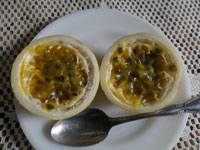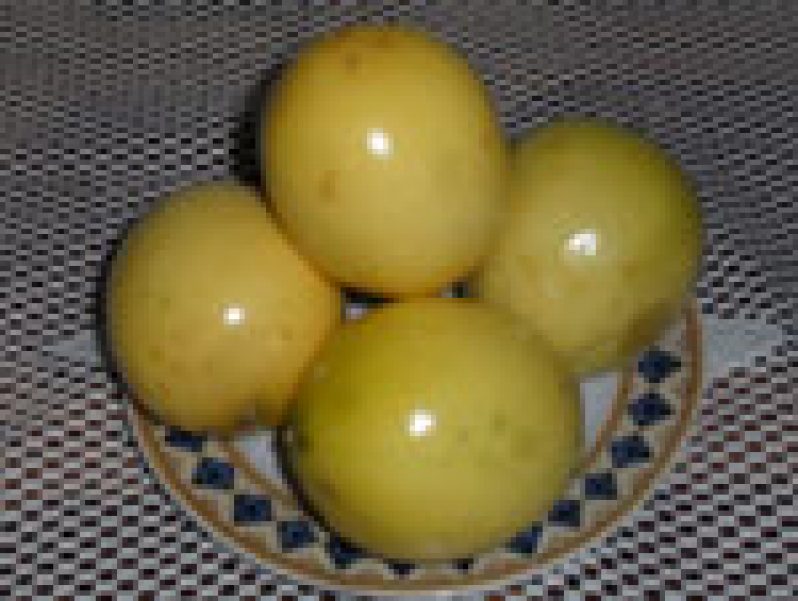ORANGES are recognized in Guyana today as one of the most widely used fruits, constituting a rich and reliable source of Vitamin C; and caring parents invariably stock oranges at home, if only to ensure that their children have a daily supply of this crucial vitamin.
 Of late, however, oranges have become somewhat scarce on the market, effectively pushing its price upwards and practically out of reach of the average working class home. It would probably be safe to say that the retail price for oranges has doubled. Where previously four or five big, juicy oranges were sold for $200., today four medium-sized oranges — or sometimes three large ones — are fetching a price of $400., “take it or leave it.” If $200 is all the shopper can afford at the time, then he/she might have to settle for three small ones that are slightly bigger than a tennis ball; and that’s the reality of the situation in regard to shopping oranges in GT at this time.
Of late, however, oranges have become somewhat scarce on the market, effectively pushing its price upwards and practically out of reach of the average working class home. It would probably be safe to say that the retail price for oranges has doubled. Where previously four or five big, juicy oranges were sold for $200., today four medium-sized oranges — or sometimes three large ones — are fetching a price of $400., “take it or leave it.” If $200 is all the shopper can afford at the time, then he/she might have to settle for three small ones that are slightly bigger than a tennis ball; and that’s the reality of the situation in regard to shopping oranges in GT at this time.
I have often seen mothers pick up the parcels of oranges, scrutinize them thoroughly, then forlornly and resignedly place the insignificant looking parcels into their bags before paying for them and walking away. Their entire body language reads: “Well, I want it, so I might as well just pay the price.”
Programmed? But do mothers really have no alternative but to pay $200 for three tiny oranges, or $400 for three half-sized ones; and green at that? Of course they have alternatives! One might argue that it’s a matter of choice, and while that has to be respected, very often it’s not really a matter of choice, but of tradition. Wanting our Vitamin C from oranges is a traditional thing, and we are programmed that way.
But do mothers really have no alternative but to pay $200 for three tiny oranges, or $400 for three half-sized ones; and green at that? Of course they have alternatives! One might argue that it’s a matter of choice, and while that has to be respected, very often it’s not really a matter of choice, but of tradition. Wanting our Vitamin C from oranges is a traditional thing, and we are programmed that way.
And guess what? Some shoppers are so programmed that, if they have to leave that fruit stand without the oranges, they act as though nothing else in the world could prove an adequate substitute for Vitamin C, and so they walk away until it is convenient for them to return and make the purchase.
As a source of Vitamin C and micronutrients, oranges are good for one’s health; but are they worth the stress and strain to obtain when finances are scarce and that child might be at home desperately in need of any fruit that is adequately enriched with Vitamin C?
Amazing alternative
Around this time, there are lots of other succulent and equally palatable sources of Vitamin C on the market. So why not zero in on some of those other fruits and keep your immune system in good shape?
A fruit that immediately comes to mind is the ‘passion fruit’, known to some as the granadilla. Other Vitamin C-enriched fruits that are reasonably priced and are abundant in and around the city are limes, cherries, plums and tomatoes. But the passion fruit is recommended as a good, palatable and juicy alternative to orange. It also has a longer shelf life than cherries, plums and tomatoes.
So popular has the passion fruit become that it is now being said in local parlance: “A passion fruit a day keeps the doctor away,” and for good reason.
The passion fruit is currently being sold in the city in parcels of eight (8) for $200, or sometimes six (6) larger ones for the same $200. This compares very favourably with purchasing three (3) medium-sized oranges for the princely sum of $400.
Passion fruit is, unfortunately, being used in the city mostly, if not only, to make a Vitamin C-rich drink. The meat of the fruit (tiny juice-filled sacs containing the seeds) is placed into a blender and whisked to produce richly-flavoured drink. The drink is separated from the crushed seeds by repeatedly being strained, is left to stand, and is sweetened before being refrigerated.
However, to derive maximum health benefits from the passion fruit, it is better to use it the way country folks do: Wash the fruit before cutting it into two halves, then, using a spoon, extract the pulp and eat it. That’s quite appetizing, and you don’t need to add sugar as in the case of making the fruit drink. Sugar is known to break down the Vitamin C content of the fruit. Hence, you benefit from the fruit maximally when you eat it in the way described above.
The nutritional properties and health benefits of the passion fruit are listed hereunder (as provided by Nutrition-and-You .com)
* Passion fruit is a good source of anti-oxidants, fibre, vitamins and minerals, including magnesium, iron, copper and phosphorous.
* It is rich in Vitamin C (ascorbic acid), a powerful water-soluble anti-oxidant, and so helps the body develop resistance against flu-like infections and removes harmful free radicals or unstable molecules.
* It is a good source of dietary fibre, which also helps to remove cholesterol from the body and acts as a bulk laxative to protect the mucous membrane of the colon, by decreasing exposure time to toxic substances. Importantly, it also binds up cancer-causing chemicals in the colon.
* It is a good source of Vitamin A, essential for good sight, and required in maintaining healthy mucous membranes and skin. Vitamin A is also known to offer protection from lung and oral-cavity cancers.
* Besides all the foregoing, the passion fruit is rich in potassium, an important component of cell and body fluids, and also helps regulate heart rate and blood pressure.



.jpg)










